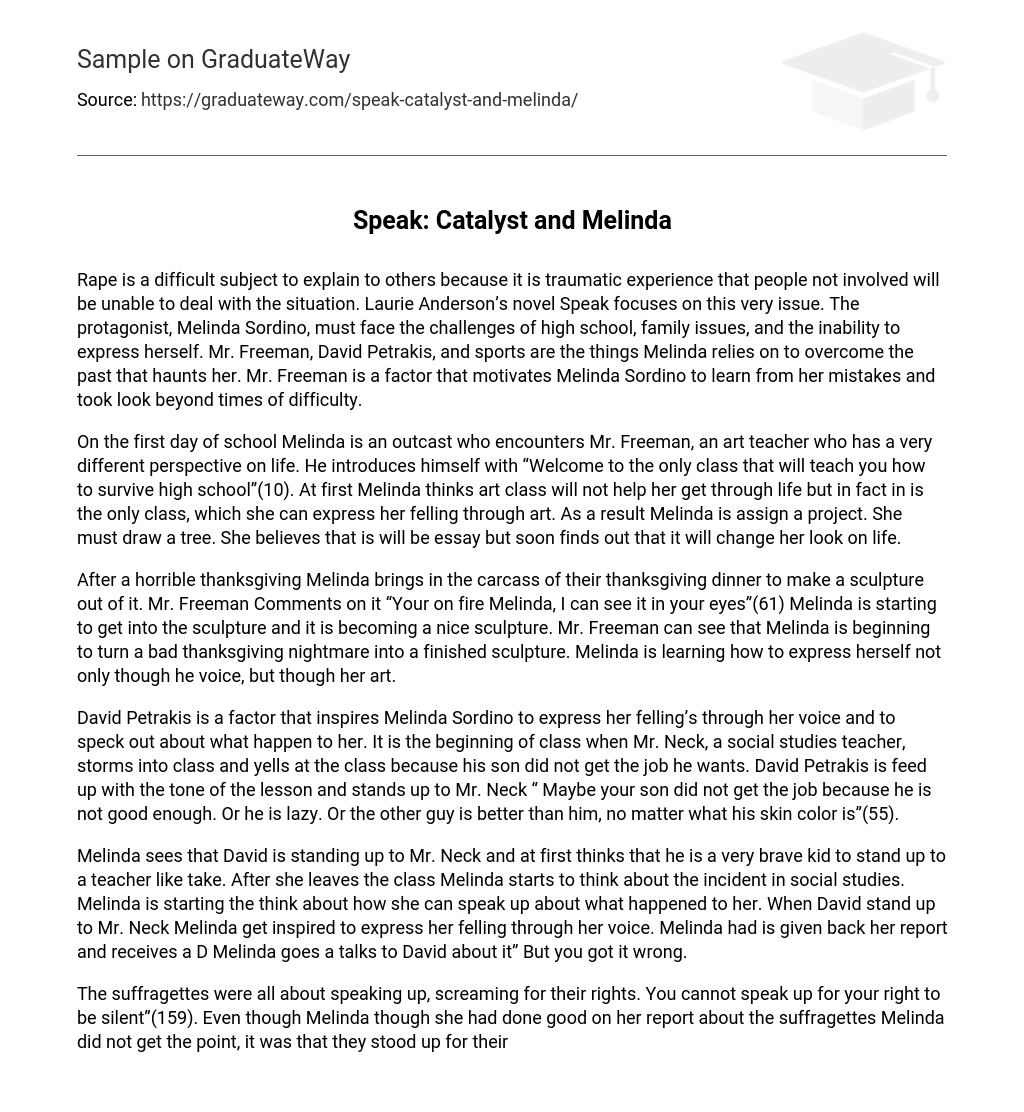Conveying the difficult nature of rape to others can be a daunting task, as it is an experience that those not involved may find hard to comprehend. Laurie Anderson’s novel Speak tackles this issue through its main character, Melinda Sordino. Melinda faces various challenges in her life, including navigating high school, dealing with family issues, and struggling to communicate effectively. In order to overcome the lingering effects of her past trauma, she seeks solace in Mr. Freeman, David Petrakis, and sports. Among these influences, Mr. Freeman plays a significant role in Melinda’s personal growth by serving as a catalyst for change and inspiring her to learn from her mistakes while finding inner strength during times of hardship.
At the start of the school year, Melinda, who is considered an outsider, has a chance encounter with Mr. Freeman, an unconventional art teacher. He greets her with the statement, “Welcome to the exclusive class that will equip you with survival skills for high school” (10). Initially, Melinda doubts the significance of art class in her life. However, she discovers that it is the only subject where she can convey her emotions through artistic expression. Subsequently, Melinda is tasked with a project – drawing a tree. Despite thinking it would be effortless, she soon realizes that this assignment will profoundly transform her perspective on life.
Melinda turns her disastrous Thanksgiving dinner into a sculpture, with Mr. Freeman recognizing her passion and acknowledging that she is “on fire.” As Melinda continues to work on the sculpture, it becomes clear that she is using art to transform a negative experience into a completed artwork. In doing so, Melinda not only finds a new form of self-expression but also utilizes her voice.
David Petrakis inspires Melinda Sordino to find her voice and speak up about her own experiences. The incident happens in a social studies class where Mr. Neck, the teacher, comes in angrily and scolds the class because his son didn’t get a desired job. David gets frustrated with the tone of the lesson and confronts Mr. Neck, suggesting that his son may have not gotten the job due to incompetence, laziness, or being outperformed by someone else regardless of their race (55).
Melinda observes David’s courage when he confronts Mr. Neck. Initially, she admires him for standing up to such a strict teacher. However, after leaving the class, Melinda contemplates the incident during social studies. She begins contemplating how she can also speak up about her own experiences. Witnessing David’s bravery, Melinda feels inspired to voice her own emotions. When Melinda receives her report and sees that she has been given a D, she approaches David to discuss it, saying, “But you got it wrong.”
The suffragettes were advocates of expressing their rights through speaking up and making their voices heard. Melinda, despite previously believing she had done well on her report about the suffragettes, did not comprehend the essence of their message – that they stood up for their rights using their voices. This is an important lesson for Melinda to learn. David is attempting to convey to Melinda that she must develop the ability to speak up and express herself. Engaging in sports helps Melinda feel accepted within a new circle of friends and diminishes her sense of worthlessness.
In the gym, Melinda is practicing foul shots when the basketball coach approaches her. He offers her an enticing deal – if she volunteers to teach the Basketball Pole how to make a successful foul shot, she will receive an automatic A in gym class (77). Despite the tempting offer, Melinda decides not to take advantage of it. However, she discovers that she has a natural talent for basketball. Although she is interested in joining the team, her concerns about physical contact hold her back. Fortunately, she begins to feel a sense of belonging in the school again, as the school relies on her skills. This newfound inspiration motivates Melinda. In gym class, the girls participate in a tennis game, and Melinda is quite skilled at it. Consequently, she is paired with Nicole. “Ms.
Connors partners me with the athletic goddess Nicole to showcase the game to the rest of the class. I serve first and we engage in a brief rally. Then, Nicole serves at an astounding speed of ninety miles per hour, with the ball just skimming inside the court. It’s my turn to serve, and I forcefully hit the ball towards Nicole’s face…(170). During Melinda’s gym class, particularly her tennis match with Nicole, she not only manages to release her bottled up resentment but also experiences the exhilaration of excelling in a task. Despite not emerging victorious against Nicole, Melinda starts contemplating her future and embarks on practicing tennis with her dad.
Melinda’s belief in her own capabilities to navigate through ninth grade and make any kind of plans was not very strong. However, her decision to take up tennis as a hobby indicates a new willingness to actively participate in life. Unlike Melinda, most individuals are able to get through high school without encountering the significant challenges she must confront. In her novel Speak, Laurie Halse Anderson encourages her audience to advocate for themselves, reach out to peers during difficult times, and pursue activities that align with their interests. By following these principles, readers can indirectly overcome various obstacles in their own lives, regardless of their size or magnitude.





